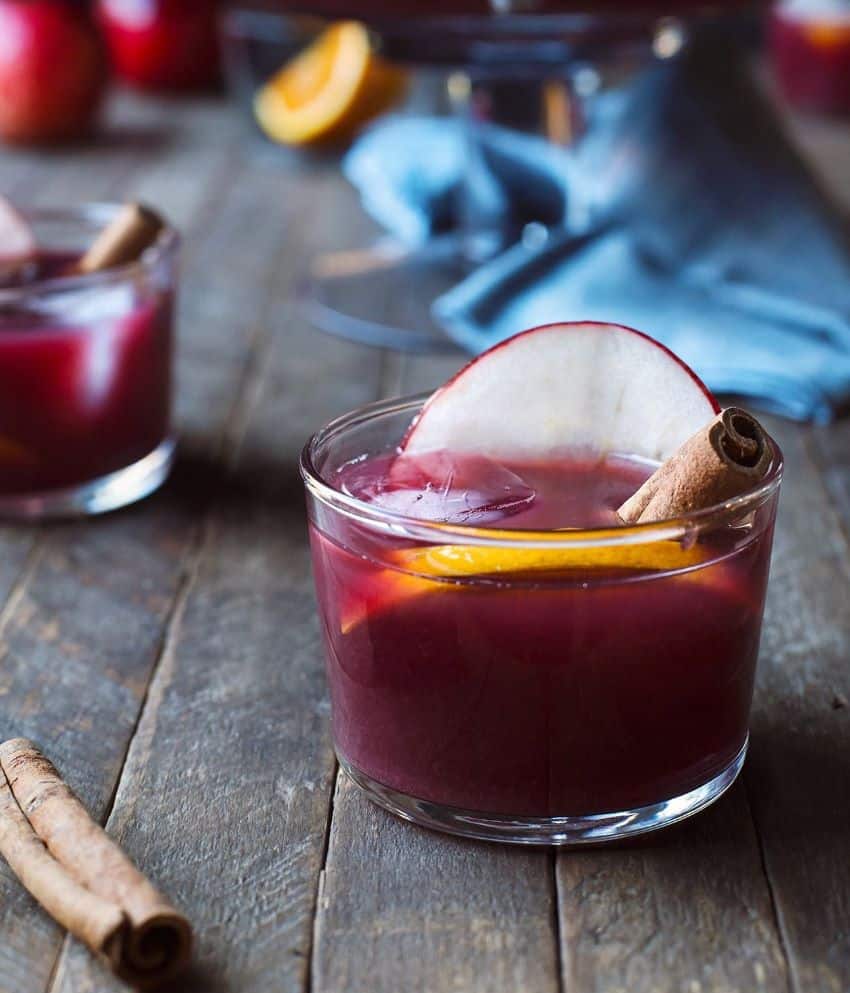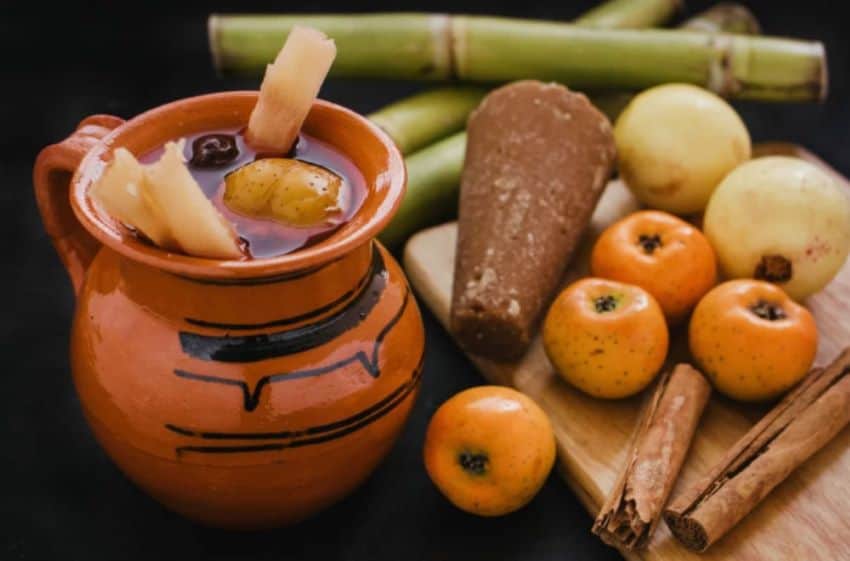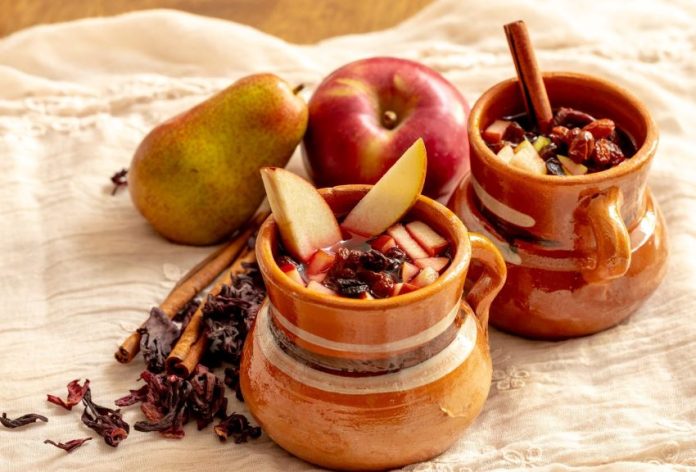Holidays are always a good time to add something new and festive to the table, don’t you think? In Mexico, the winter holidays stretch from December 12, the Festival of the Virgin of Guadalupe, to the Day of the Magi on January 6. I’ve lived in neighborhoods where posadas moved from house to house during that time, and also on one street that was closed each evening so that everyone could gather outside with their neighbors, sharing food and drink, prayers and song.
While this year posadas will most likely be curtailed, there’s no reason why you can’t celebrate in your own home with your own “pod” of people. Ponche navideño and rompope (Mexican eggnog) are both traditional drinks at this time of year and are easily made. Yes, you can buy both drinks bottled, but homemade tastes so much better.
Rompope comes from the Spanish ponche de huevo (literally “egg punch”). Legend says an order of nuns in Puebla came up with the recipe in the 17th century, but their “secret ingredient” remains unknown to this day. (Could it be ground almonds? I wonder …) Rich and velvety, rompope can be served either warm or cold.
Every area of Mexico, and maybe even every family, has its own recipe for Ponche navideño. It’s kind of like mulled wine — fresh and dried fruits and spices simmered in a sweetened alcohol base. It also includes tejocotes (hawthorn fruit), sugarcane, hibiscus flowers and tamarind. The combination is high in Vitamin A and Vitamin C — exactly what we need during the chilly winter months.
While different versions of ponche are served throughout Central and South America, it actually comes from India, where it’s called “pãc,” meaning “five.” That’s based on the five ingredients in any punch: sour, sweet, liquor, water and spice. The British called it “punch,” which became the Spanish ponche.

Tejocotes are an unusual fruit you may not have encountered before. The size of a large grape, they look like a crabapple and are yellow or orange. If you find fresh ones, they need to be blanched and peeled, as the skin is quite bitter. They’re also available in jars or frozen, already peeled. If you can’t find them, substitute an Asian pear cut into cubes. Also, tamarind paste can be used instead of fresh tamarind pods. Serve Ponche Navideño garnished with a cinnamon stick and with a spoon so that you can eat the chopped fruit at the bottom of the cup!
Rompope Tradicional
- 2/3 cup blanched almonds
- 1½ cups + 2 Tbsp. granulated sugar, divided
- 6 cups whole milk
- 2 cinnamon sticks
- Rind of 1 lemon
- 1 tsp. pure vanilla extract
- ¼ tsp. baking soda
- 8 egg yolks
- 1 cup white rum or aguardiente
In food processor or blender, pulse almonds with 2 Tbsp. of the sugar until ground to a fine paste. Bring milk, cinnamon, lemon rind, vanilla and baking soda to a boil over medium-high heat in a large heavy-bottomed saucepan. Reduce to medium-low; simmer for 15–20 minutes. Set aside.
In large bowl, whisk egg yolks, remaining 1½ cups sugar, and ground almond/sugar mixture until thick and pale. Remove cinnamon sticks and lemon rind from milk mix and discard. Whisking constantly, slowly add the milk mixture to yolk mixture.
Return mixture to pan. Cook carefully over low heat, stirring and scraping pan, until thickened, 5–7 minutes. Cool completely, about 2 hours. Add alcohol before serving.
Orange Rompope
- 8 cups milk
- 1 cup sugar
- 1 tsp. vanilla
- Peel from 1 orange
- 8-12 egg yolks (adjusted to thickness and richness you prefer)
- 2 cups heavy cream or half and half
- 1 cup condensed milk
- Rum
Combine milk with sugar, vanilla and orange peel in a pot and bring to a boil. Reduce heat to low; cook about 30 minutes, stirring occasionally to prevent burning. Set aside.
Blend or whisk egg yolks with condensed milk until combined. Add cream or half and half and whisk or mix again.
Add a cup of the milk mixture to the egg mix and stir, then add remaining egg mix to milk mixture. Return to heat and cook on low, stirring constantly until mix starts to thicken. (Don’t let it boil.)
Cool completely; stir in alcohol. Refrigerate until ready to serve, warm or cold.

Ponche Navideño
This is a basic recipe — feel free to fiddle with the amounts of the ingredients.
- 10 cups water
- ½ cup jamaica (dried hibiscus flowers)
- 3 tamarind pods, shell removed
- 3 small piloncillo cones
- 8-10 guavas, washed, ends trimmed and halved
- 8-10 tejocotes OR 1 cup Asian pear, cubed
- 1 orange, cut into quarters, with skin
- 1 red apple, cubed small
- 2 pears, cubed small
- 1½ cups cubed, peeled sugarcane
- 7-10 pitted prunes, chopped
- Handful of raisins
- 3-4 cinnamon sticks
- 4-8 cloves
- Brandy or rum
Put water in a large pot; add peeled tamarind pods and jamaica. Bring to a boil and simmer for 10–15 minutes. Remove from stove; strain out the hibiscus and tamarind pods. Put liquid back into the pot.
Push cloves into oranges. (So you can find and remove them later.) If using fresh tejocotes, prepare them as explained above.
Add oranges and all remaining ingredients except alcohol, to the pot. Cover and simmer 30–45 minutes, stirring occasionally, until fruit is tender and piloncillo dissolves. Remove cloves from oranges, returning fruit to pot. Add alcohol individually to each cup when serving.
Janet Blaser has been a writer, editor and storyteller her entire life and feels fortunate to be able to write about great food, amazing places, fascinating people and unique events. Why We Left: An Anthology of American Women Expats is her first book.
